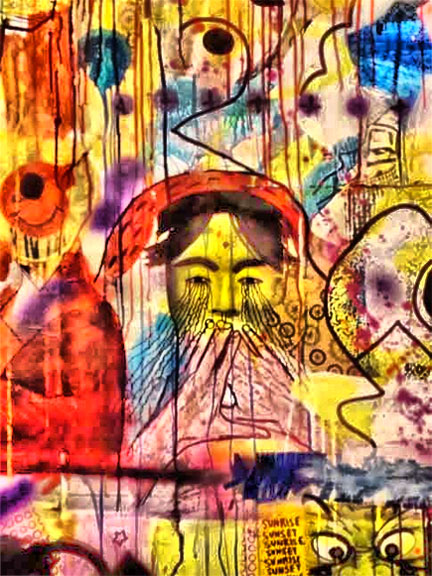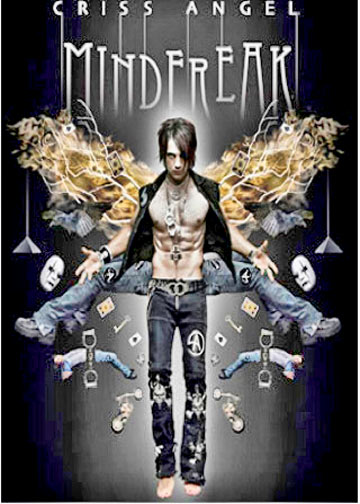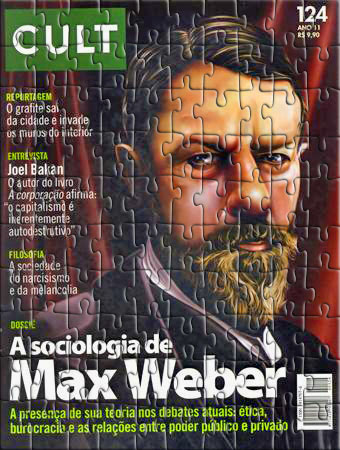|
|
|
 |
|
|
|
 |
|
 |
|
|
| He was a lawyer, a politician, historian, political economist, and with Emile Durkheim, the founder of modern Sociology. Maximilian Karl Emil Weber was born in Erfurt in Thuringia, Germany - also the home of the German Christian Movement and The Institute for the Study and Eradication of Jewish Influence on German Church Life. Which Lucky simply calls: The `Tute.' He was a 7th child, but not the 7th son. His old man was rich and a powerful Liberal Party Pol. His mother was a rigid Calvinist with a `no nonsense' bent and Moral Absolutist Certainties in place of beliefs. He and his brother, Alfred, were curve-breakers and over-achievers. He did the University of Heidelberg as a Law Student, where he also studied Economics, Medieval History, and Theology. Then the University of Berlin, the University of Gottingen, and intermittent bouts of Military Service. The Germany of his time was passing thru the archetypal stage of transition from Rural/Agriculture to Urban/Industrialization. Old ways were dying. Old settled-truths were stirred up and dumped. Traditions were melting away. Beliefs were going the way of the vanishing Grange. Durkheim coined the term: Anomie to describe the process. Anomie is the decay and loss of Tradition, Mores, and beliefs. Especially religious beliefs. The social scene that Max Weber was born into was one of dissolution and disenchantment; the family was breaking up, the Sippe was being replaced by Factory Unions, the Volk were confused about their blood. Anomie is an inevitable consequence of Change which comes too quickly. It took England 150 years to go Industrial. It took America 75 years. Germany did it in less than 50 and that was the infection eating at its soul. The village and the Bauer were disappearing faster than anything which could replace their social structures. Interesting times. |
|
|
|
That's the desiccated corpse of a Dead Fairy to the right. Ok, don't believe it. Go ahead and illustrate my point. Karl Marx, Émile Durkheim, and Max Weber were all involved in the same project: the Sociology of Religion and the Sociology of Government. All of them had the same suspicions: that Politics would always Piggy-Back on the decaying bones of some Religion. And that the Forms of the Religion would survive as the Bones of the Body Politic. The Crises of Modernity were eating away at the Soul of the Volk. Capitalism was the infection and Weber's point was that Capitalism was not a purely economic and materialist phenom as Marx insisted, but that it was the bastard child of religious ideals and dogmas which were inherent in The Protestant Ethic. He once defined the `State' as that entity which claims a "monopoly on the legitimate use of Violence," and in that definition you can still see the Rationalist Machinations of the Church and of Religion. Still today, Max Weber's most important work is his essay: "The Protestant Ethic and the Spirit of Capitalism." Rationalization was his point of departure for all of his studies. His constant themes were "the effect of religious ideas on economic activities, the relation between social stratification and religious ideas, and the distinguishable characteristics of Western Civilization." After his analysis of Protestant sects in Amerika, he pressed on with analytical essays on: "The Religion of China: Confucianism and Taoism," "The Religion of India: The Sociology of Hinduism and Buddhism," and then the incomplete: "Ancient Judaism," which was forestalled by his sudden death in 1920. Why had these cultures followed their specific and idiosyncratic paths? In answering these questions Weber hoped to explicate the singular Path of Western Civilization with an eye to discovering its trajectory and its future. |
|
 |
|
 |
One thing stood out of all of his studies which helped explain the strange path of the West in comparison with the other Civilizations and their Religions. Magic. In the West, Magic had died. In one of his writings - "Science as a Vocation" - Weber was explaining what it means to engage in Science, and, in fact, any Intellectual Activity typified by Rationalism. The Modern World - which runs on Rationalism - Weber claimed, is a thoroughly "Disenchanted" world. This meme became his catch-phrase by which Weber is known today. He called this situation the "Entzauberung der Welt." The Disenchantment of the World. Why, he asks, would one give his life to Science - a "task" whose completion no one can ever see? Science - or the type of Knowing which IS Science - is theoretically infinite. The incremental gnosis of the world's workings and their technological spin-offs were not sufficient as an answer. Weber points out that your everyday Hans und Hansi on the street has no ability to understand the techno-workings of things like Streetcars, camshafts, steam-pistons, or any of the Modern Marvels which our ancestors would have insisted were simply "Magic." So Moderns live Sans-Gnostically about the "Conditions of Life." Every Pagan suckled in a Creed outworn it turns out had a far deeper gnosis of how Life worked and what his place in Life was. But it's not important that Moderns do not understand Science and Technology - their "Conditions of Life." What is important is that it is Possible for every Hans and Hansi to grasp the principles of Science and Technology. We don't understand Electricity and Nuclear Energy - but we can. We could. With education, everything can be known. So the World is Potentially explicable from Macro to Microcosm. Like Spinoza insisted: There are no loose threads dangling in the Implicate Order of Cause and Effect. There are no Mysteries. |
|
|
|
Chriss Angel, the best of the Modern Magicians, makes a fortune on the premise that there is no such thing as Magic. That Magic is about Illusion and not the suspension of Universal Laws. One of the reasons that his Illusions are so Successful at passing themselves off as Magic is the old X-Files Rubric: I want to Believe. Modernity is founded on the pledge that there is No Magic. But Monkeys desperately want to believe in Magic. Every Religion on Earth - including the Cults of Scientology and Unitarianism - revolve around trust in a Cosmos which is - at its Core - riddled with the Supernatural. The Potential, latent in Science, that Everything can be known, and that there is Nothing which can hide in "Magic" is the Source of the World's Disenchantment. "By creating an intellectual environment in which anything can in principle be explained by scientific analysis and/or calculation, intellectual rationalization has removed the possibility of metaphysical/spiritual - essentially nonscientific - explanations of the world and its features, And this, Weber writes, `means that the world is disenchanted.'" Explication=Kenosis. Explaining the World drains it of its Numinosity. Kenosis again. When Spirit has emptied itself - totally - into Matter and Forms, then there is no more "Interior Presence" - it's all been emptied out into the world of things. So it becomes: Meaningless. Monkeys, whose minds innately default to Magic, cannot live without Meaning. You can hear, in the wings of time, Marcel du Champ and Salvadore Dali singing a pornographic ditty about Dada und MOMA knowing themselves with abandon. You can see Sartre et Camus at the Café du Flores quarreling over who leaves the pourboire and whether or not Karma can accrue in anything outside of Coca Cola. |
|
 |
|
|
|
|
|
|
|
|
|
|
|
|
|
|
|
 |
The Painting is from 1930 and is by the Polish/American Artist: Max Weber. I'm sure - since it's not fashionable to believe in `Meaningful Coincidence' - that the two are not related. Max the Artist was semi-big in Cubism and Modernism with a touch of Jewish Surrealism. All those Art forms which had been born of Western Anomie and Disenchantment. Weber, himself, prophetically claimed that this Entzauberung - this Disenchantment - would have consequences and manifestations in all areas of human activity. Most especially Art - since Art is the Primary vessel into which a Kenotic Spirituality empties itself. Barber told Lucky, somewhat bitterly, that when god leaves the Monkey's mind, he leaves behind his Shadow. The Shadow's name is Art. But it's other name is Politics. And while Art stands to Benefit from the dissolving Deity, Politics does not. Disenchantment, as Politics, equals Confusion, loss of Values, loss of Purpose, and worse ... much worse ... loss of Morality tied to Means. Without god and his Moral glue, what is to decide whether or not the End Justifies the Means? Both Art and Politics get Fat on the necrotic bits and pieces of a decomposing Religion. Religion doesn't go away - it's parts are bricolaged into the next Avatar: Politics. As William Gass so aptly put it in his Abstract-Expressionist Novella: In the Heart of the Heart of the Country - "For all those not in love, there's politics." In the Modern World only Art and Politics can fill the void left by the Entzauberung. Interesting Factoid: Hitler, Churchill, Eisenhower, even Himmler, were all Artists to one degree or another. Himmler wrote Poetry. Be afraid. Be very afraid. Mussolini, like Churchill, and Silvio Berlesconi, were Journalists first. Politics has the same problem as Modern Art - "an increased difficulty in fulfilling the obligations" of a Medium for Meaning. Monkeys expect Politics to address the same crises they used to pray to god to solve. Good luck on that. And Art has jettisoned all `Bearers of Meaning' whatsoever and has retreated to the Amorphic and the Sans Parole. |
|
|
|
More dead Fairies. Anyone who doubts the power and the pull of Magic on the Monkey Mind should ponder the crowds who routinely gather in Gas Station Rest rooms, or who gawk at Tacos, or Oil Stains on the driveway, because they see in them the Virgin Mary, or Jesus on his Cross. Most American Monkeys believe in ghosts, god, and the existence of angels and demons, imps, goblins, ghouls, ET anal-probes, heaven, hell, purgatory and daily miracles. Limbo is out. PapaRatzi says Limbo's for Suckers and Saps and that unbaptized babies can't go to heaven, and they sure can't go to Hell, so they just somehow `go away.' It would be interesting to hear the Vatican's expectations as to the destiny of the souls of the aborted. If souls are finite then the Universe is on the clock. If souls are infinite then what happens to the souls of those who `could have been born' after the End of Days? So fuck fairies - they're all dead - victims of the Entzauberung. Get into Souls! They're the last things left from the ancien régime. |
|
 |
|
 |
|
|
|
Barber Perfect painted this Oil of John Calvin. Weber based his Protestant Ethic argument on the 4 Attributes of Calvinism: 1. Doctrine of the Calling: God has called All to work for His glory. Man does this thru his Earthly Work. Thus Work and Labor acquire a Divine Purpose. This leads further to a "high value on Excellence." Hard, good Work becomes the Norm. 2. Predestination: Only God can choose who will be Saved and who will not. Catholics taught that the Sacraments and Obeying the Church Commands led to Heaven. Calvin taught that since we cannot know who is Elected and who is Damned then the fall-back was Biblical teachings and Promises. Good work gets you to heaven. And good work leads to Success. And success equaled money, power and worldly position. What is Above is What is Below so presto: we can know the Saved by who is doing well on earth. Being Rich = Being Chosen. Goebbels was right; always go for the Big Lie. 3. Asceticism: Protestants, Calvin said, should pursue Success with "puritan passion." Weber called that: "Ascetic Rationalism." If you lived simply, without ornamentation and ostentation then even the poor could afford to "amass capital and enter the market." Capitalism became the source of Grace and Sacraments. 4. The Doctrine of Sanctification: Commodity Goods thinking strips Nature of its Sanctity and leads to Rational Thinking. Life, Calvin said, was the process by which God was Sanctifying them to be "complete and perfect bearers of his image." So all of life was to be pursued "with the sincerest rationality." |
|
|
|
Barber's point about god's shadow should remind you of Plato's Cave. Memory designed itself to work that way - by simple association, followed by Winnowing towards the Tenor's connotation. It's Bayesian, and Bayes, when he found the formula for the Winnowing, said that he had just looked into god's mind. Weber noted a huge contrast "between past and present valuations of science." In Plato's time "Science" plays the role of the All Seeing and Truth-Telling Sun, Light, or Fire, while busy little Monkeys hunch around in fear and follow the shadows which are cast by them but which are not of them. Today, our "Science," hides in the shadows of Intellectual Constructions and Abstractions which only a handful of Menschenkenners. can understand. Science - in Weber's time - could say nothing of Value and Meaning which would lead a Monkey to become a Man. In a valueless cosmos it's a fool who looks for values in abstract forms of True Being. Weber quotes Tolstoy: "Science is meaningless because it gives no answer to our question, the only question important to us: `What shall we do and how shall we live.'" Sartre had the only real answer for that. When there's no where to go, where do you want to go? After god dies, Man is Free. He has no Nature except the one he designs for himself. Absolute Freedom in Absolute Isolation. "It's Cold out there," says Bill Murray in Groundhog Day. Sisyphus just gave you the finger. Religion used to be the Weatherman in the days when there were no Meteorologists. You're alone out there, Sailor. There's no Magic. No God. No Meaning to Life except the one you give to it. That's the cost of our Gnosis, our Science - The Disenchantment of the World. It's cold out there. |
|
 |
|
 |
Weber did not write that the Entzauberung was total - that it affected All Religions or All believers in the same way. In fact, Weber made a distinction between Religions of Magic and Religions of Redemption. Those faiths of Redemption/Salvation, Weber said, were themselves responsible for Rationalization itself and the "rational conception of the universe." The lynchpin in the Myths of Redeemers is the "assumption of a world order" which implies a "meaningful cosmos." In his book: The Social Psychology of the World Religions, Weber argued that "The idea of redemption involves the identification of something in the actual world which is experienced as specifically senseless." Something which has to be explicated and made to fit the myth. "The consequent development of a systematic and rationalized image of the world allows people to take a corrective stance in response to the senselessness in the world. Religions of Redemption tend toward systematic, comprehensive rationalizations of problems and their solutions, in contrast to Magical Religions which are remedial in a non-systematic way." Rationalization itself became a Mental Skill and detached itself from Religious thinking. Eventually, Religion loses "authority over forms of rationalization that once provided key elements of its demonstration of the meaning of the cosmos . . . and disciplines like history, biology, law, and political theory challenge rather than support central traditional claims of a religion." Anomie follows. Other disciplines, like Psychology and Art, now compete with religion for "authority over the solution to concrete human problems." Ironically, as Science advances towards the Rational and the Proven, Religions fall back on what cannot be Proven: miracles and apparitions, signs and wonders. Jesus in the Taco. Mary in the Stains. The Angels of Mons leading the troops to victory over Satan. Weber points out that as the World has become more and more Rational, Religion has been made the Custodian of the Irrational. |
|
|
|
|
|
|
|
|
|
|
|
|
|
|
|
|
|
|











